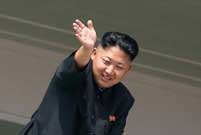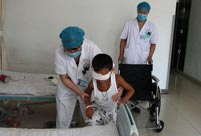Beijing's proposal to charge drivers for traffic congestion has stirred strong public debate, with many people saying it's just a palliative to soothe the capital's ills.
Congestion fees are being considered as part of the city's latest clean air plan to reduce gas emissions and heavy traffic loads.
Many residents blamed the traffic problems on weak government management and believe the problems should not be paid for by car owners.
"If the roads are still jammed after I pay the congestion fees, will the transportation authorities promise me a refund?" joked a Beijing resident named Cao Lei.
According to poll results released Tuesday by the China Youth Daily, 37.7 percent of 2,001 respondents from Beijing and Shanghai support levying congestion fees, while 42 percent oppose the charges.
The survey results may not be very accurate, as 72 percent of the surveyed own at least one car, according to the China Youth Daily. The survey did not provide a more thorough analysis on how pedestrians think about the proposal.
The Beijing Municipal Commission of Transport said Tuesday there is no exact timetable for the congestion fees plan, but it will come out at the "right time" after adequately soliciting opinion.
Back in 2010, the south China metropolis of Guangzhou proposed a similar plan, but it was soon shelved due to strong public protest.
Li Keping, transportation engineering professor with Tongji University, thought that the move may be effective for the current "urgent situation" in Beijing, but he suggested testing the charges in pilot areas for fear of "side effects."
Still, the poll shows over half of respondents said they will reduce their car use if the fees are levied.
Many car owners said taxes on car purchases are already too much, and they do not want to pay any more.
Beijing has harshly restricted car purchases due to severe air pollution and traffic jams in recent years, but the capital still registers more than 210,000 new cars every year.
Though growth has slowed, the automobile industry remains an important stimulus for China's consumption and the overall economy.
According to statistics from the China Association of Automobile Manufacturers, 10.78 million cars were sold in China in the first six months of this year, a year-on-year increase of 12.3 percent.
"Neither the purchase restrictions nor the levying of congestion fees will fundamentally change the traffic situation in cities," said Zhao Hang, head of the China Automobile Technology & Research Center, noting those measures may thwart the automobile industry's development.
A stricter tightening over the use of vehicles in cities will inevitably discourage people from car purchase, thus further damaging the interests of automakers.
Zhao held that efforts should be made in exploring new management methods, such as adopting staggered office hours and building more parking lots to reduce the number of parked cars along roads, which often cause congestion.
According to the China Youth Daily's poll, most respondents blame unreasonable city planning as the primary cause of congestion, while 80.5 percent of the surveyed expect an improved public transportation system to relieve traffic jams.
Guo Xiaobei, who is in charge of the Institute of Comprehensive Transportation under the National Development and Reform Commission, placed high hopes on the city's rail transit system.
In Guo's eyes, the rails will play a great role in China's future urbanization as they are fast and have a larger carrying capacity.
He said the insufficiency of public transportation facilities is the root of traffic congestion. "Cars cannot be everything, especially for cities with tens of millions of people."
Last year, public transportation accounted for about 44 percent of all trips in Beijing, and about 50 percent of trips in Shanghai.
Guo suggested a diversified rail transit system combining metro lines, light rail and tramcars, which Beijing has so far struggled to build.
 DPRK holds military parade to mark 65th founding anniv.
DPRK holds military parade to mark 65th founding anniv. Highlights of MAKS 2013 Int'l Aviation and Space Show
Highlights of MAKS 2013 Int'l Aviation and Space Show  10th China-ASEAN Expo opens in Nanning
10th China-ASEAN Expo opens in Nanning Eagle Boy takes to sky to break another record
Eagle Boy takes to sky to break another record 12-year-old boy becomes pillar of the family
12-year-old boy becomes pillar of the family Eye-gouged boy receives blind rehabilitation in Shanxi
Eye-gouged boy receives blind rehabilitation in Shanxi Top 10 naked hotels in the world
Top 10 naked hotels in the world The most gorgeous Chinese women in the eyes of foreigners
The most gorgeous Chinese women in the eyes of foreigners A collection of bizarre rooftop buildings around China
A collection of bizarre rooftop buildings around China Residences of the royal house of Savoy
Residences of the royal house of Savoy China's frigate 'Bengbu'in fire training
China's frigate 'Bengbu'in fire training Fresh students 'forced' to register in university independently
Fresh students 'forced' to register in university independently 2013 Taiwan Int'l Tourism Expo kicks off in Taipei
2013 Taiwan Int'l Tourism Expo kicks off in Taipei Photo story: Take a gap year
Photo story: Take a gap year Nokia's Global Headquarters: visiting a declining empire
Nokia's Global Headquarters: visiting a declining empireDay|Week|Month